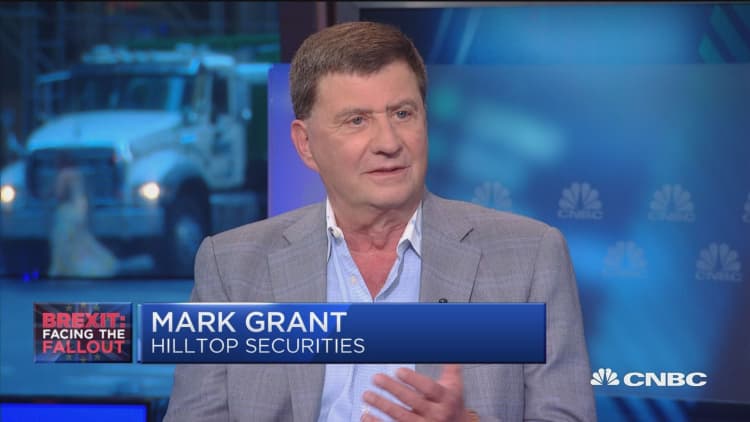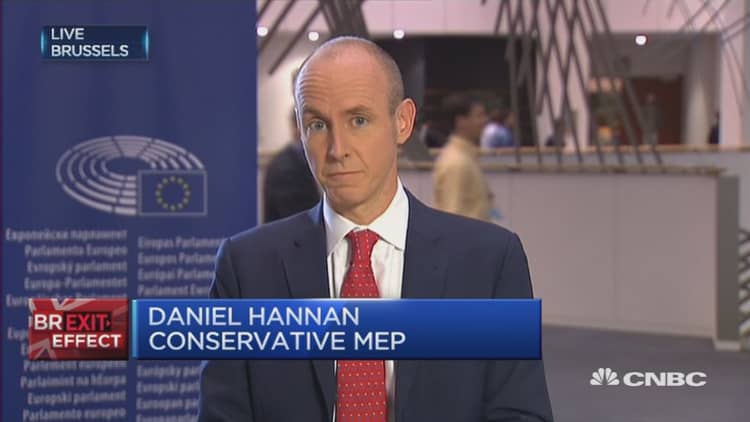The euro-sclerosis and the euro-pessimism are only a few of the old neologisms that got a new lease on life thanks to "reformers" and "crisis managers" who devastated the euro area economy with their – take a deep breath – "austerity growth model," consisting of deep public spending cuts, tax hikes, jobs-destroying structural reforms and a monetary policy that should look the other way.
Predictably, the area's economy took it on the chin and went down for the count, with millions of lives destroyed by soaring poverty and destitution -- until the European Central Bank (ECB) stepped in to provide the antidote to that cruel nostrum and to begin a long process of healing and recovery.
The ECB's intervention eventually stiffened the spines, and gave some oxygen, to scared and disoriented political leaders in France, Italy, Spain and Portugal – exactly one-half of the euro area's GDP – who abandoned the fiscal madness and structural destruction to latch on to the life jacket thrown at them by their lender of last resort.
The economic recovery we see now is a result of that policy mix. At 1.7 percent, the euro area growth last year matched the pace of the U.S. economy and seems poised for further gains in the months ahead.
Beating the "Trump rally"
The ECB-driven recovery was also reflected in steadily rising asset values. As of last Friday, the euro area equity prices (Euro Stoxx 50 in dollar terms) were 17.3 percent above their year-earlier level, with nearly half of that increase (7.6 percent) recorded since the beginning of this year.
That beats the S&P 500 on both time horizons and shows remarkable market optimism at the start of a year supposed to bring big political changes in the heart of Europe struggling with social problems, unending inflows of massive immigration, fears of terrorism and a growing discontent with governing elites.
Markets literally sailed through the first such political test – the Dutch elections on March 15 -- on the strength of an inspiring economic outlook, despite opinion polls predicting the victory of "populists," "xenophobes" and "Europhobes" bent on destroying the euro and the much maligned EU. And this is what happened: Between the beginning of the year and the day of the elections (lost by "populists," etc.), Dutch shares rose (AEX, euro terms) 5.9 percent, accounting for most of this year's gain (6.91 percent as of last Friday).

The good-old Dutch traders can thank the ECB for the euro area recovery, which made it possible for them to pocket last year their $65 billion trade surplus (a whopping 8.4 percent of GDP) and to beat their German competitors with a growth rate of 2 percent.
France is the next political test with the first round of elections on April 23. Again, anybody betting against the euro and the EU will lose big. According to the French media, voters are largely indifferent toward the presidential candidates, but the economy is improving and low credit costs have unleashed a real estate boom that's triggering solid consumer spending.
The French are also great fans of the euro: An opinion poll published last Tuesday (March 25) shows that 75 percent of the French like the European currency, and half of them are pleased with the EU, although they believe that some of their neighbors were greater beneficiaries of the whole project.
The French, of course, have Germany in mind. They are looking at Germany's huge trade surpluses and the industrial takeover by the world-beating manufacturing companies across the Rhine.
The ECB is the heart of Europe
As Washington keeps discovering, Germans don't see anything particularly strange there. They think they are just good and that they make high quality products the world wants to buy; so, take it and roll with it.
German elections next September won't change anything with regard to economic policies and trade practices, regardless of the electoral outcome. And none of the current French election frontrunners is likely to confront Germany to change its ways. Marine Le Pen would do that, but, like her unsuccessful Dutch colleague Geert Wilders, she wants to destroy everything by getting out of the EU and the euro area. She has no votes for that, and she will most probably lose.
Meanwhile, the ECB will continue to run the euro area economy and the economic systems where the euro serves as a de facto transactions currency and a store of value.
The latest numbers are showing that the area's economic recovery remains on a steady (albeit still a bit too slow) growth path. The demand for credit from the private sector is growing at annual rates of 2.6-2.7 percent. Bank loans to households and to non-financial companies were increasing at an average annual rate of 2.1 percent in the first two months of this year.
Lending to governments is still the strongest component of credit growth. In January and February, the euro area public sector loan demand grew at an average annual rate of 10 percent, suggesting that government outlays continue to play an important part in supporting the area's demand, output and employment. Last year, for example, the euro area public spending grew at an annual rate of 1.8 percent, a bit faster than a 1.6 percent growth of household consumption.
Investment thoughts
The ECB will continue to provide most of the stimulus to the euro area economy. Except for Germany, there is still no room for fiscal easing because the public finances of the monetary union as a whole remain precarious and quite uneven.
The area's budget deficit, for example, is a relatively low 1.8 percent of GDP, but its range goes from Germany's surplus of 0.5 percent of GDP to Spain's deficit of 4.6 percent of GDP, with France and Italy between 2.4 percent and 3.3 percent of GDP. A very fluid political situation in these three countries (minority governments in Spain and Italy and no consensus in France on public spending and taxes) make any meaningful discretionary fiscal restraint highly problematic.
Public debt is a similar case. The euro area public debt/GDP ratio is 109 percent, but the range is from Germany's 75 percent to Italy's 159 percent, with France at 123 percent (and literally exploding) and Spain at 118 percent.
Large and sustained surpluses of primary budgets (budget before interest charges on public debt) are necessary to stop and reverse the growth of public debt.
At the moment, the euro area shows a primary budget surplus of 1.2 percent of GDP, with Italy at 3.6 percent and Spain at 1.1 percent. France has yet to shift into a surplus position, which means that there is no way that Paris can stop anytime soon a fast deterioration of its public sector balance sheet.

That is the fiscal picture the ECB is facing. And the question is: How long can the ECB provide the only support to the euro area economy? The answer, as always, depends on price stability, the ECB's key policy mandate.
Preliminary estimates published last Friday indicate a sharp slowdown of consumer price inflation (CPI) in March to 1.5 percent from 2 percent in February, with the core CPI (excluding energy and unprocessed food) at 0.7 percent (down from 0.9 percent in February).
That is good news, but inflation still bears watching: Over the last 6 months, the euro area CPI has tripled from 0.5 to 1.5 percent.
It is reassuring, however, that the growth of unit labor costs has stabilized around 1 percent and that the euro keeps edging up against the dollar (+1.2 percent since the beginning of the year). In trade-weighted terms, the euro's exchange rate is now exactly where it was a year ago.
The benefits of a common monetary policy are becoming increasingly obvious for a group of countries bound by an integrated and homogeneous market for goods and services, with a free movement of people and capital flows.
Europeans like the euro, and there are a number of countries that desperately want to join the European community of nations (EU) observing the rule of law and running exemplary systems of equity, justice and social welfare.
For more insight from CNBC contributors, follow @CNBCopinion on Twitter.


